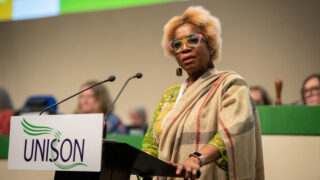Many members of UNISON, in common with Black workers throughout the country, are only too well aware of the everyday realities of racism within their workplaces and across the rest of society.
No amount of official reports can deny that lived experience. Neither are these reports required to confirm it.
The recent report commissioned by the Westminster government from the Commission on Race and Ethnic Disparities, also known as the Sewell report, can’t hide or deny the scale of the racism that is still part of Black British lives.
Before saying something about what can best be described as a disappointing report, though, it is worth reflecting on the backdrop to it.
First, Black workers were found to be far more likely to be exposed to the COVID-19 virus and far more likely to die from it. This may have been because Black workers are highly represented in roles such as education staff, health workers and delivery drivers, but it is also likely to be due to generations of public health inequalities.
This high infection and death rate amongst the Black community was undeniably in need of serious investigation.
Second, there was worldwide discontent about the murder of George Floyd, Breonna Taylor and Ahmaud Arbery and others in the US. This discontent led to a statue of a slave trader being pulled down during protests in the UK – and plans for the removal of others being made.
Thousands of Black and white people taking a knee as a mark of respect to those that have died but also as a demonstration of commitment to the principle that Black lives do in fact matter. Many athletes – particularly footballers – across the UK still take the knee before their games.
All of this means that there has been a heightening of awareness about racism and its impact over the last year. Of course, racism is not new, and these issues have been around for far too long.
It’s a real shame that it took a pandemic for people to stop, see and hear that the things many of us have been talking about for years were indeed true.
The fact is that the commission’s report appears to have ignored the realities of Black lives in Britain and the systemic inequalities that so clearly exist across the labour market, which UNISON and all trade unions in this country are unanimous in considering to be the result of long standing, structural and institutional discrimination.
A special kind of skill to weave around the truth
It really does take a special kind of skill to weave your way around that truth. However, the report manages to demonstrate just such a skill by ignoring the extent and impact of this pervasive institutional and structural racism, and making no meaningful recommendations to address these issues.
It is clear to anyone that cares to look, that Black workers are highly overrepresented in low-paid and insecure jobs, with an unemployment rate double that of white workers. This is not just some kind of accident, this is racism.
The way that Black workers are also overrepresented in redundancy situations and the high levels of racial harassment still experienced in workplaces throughout the nation are also effectively ignored by the report.
UNISON, along with all other trade unions, sees the report as a missed opportunity to make real progress on race equality.
In fact, it may well do more harm than good by its complacent attitude toward race relations in our country.
We believe that the government can still retrieve the situation by looking at earlier reports – including the McGregor-Smith report on employment, the Lammy report on criminal justice, the Williams report on the Windrush scandal, the Angiolini review into deaths in custody and the Marmot report on health inequalities.
We are not short of reports and we are not short of excellent recommendations contained in these and other reports, which can help to improve the situation facing the British Black community.
It’s not too late for the government to do the right thing and to make a genuine attempt to address the racism faced by Black workers and their families.
We, as always, will be happy to offer our expertise on the basis of a desire to bring about real and fundamental change.



